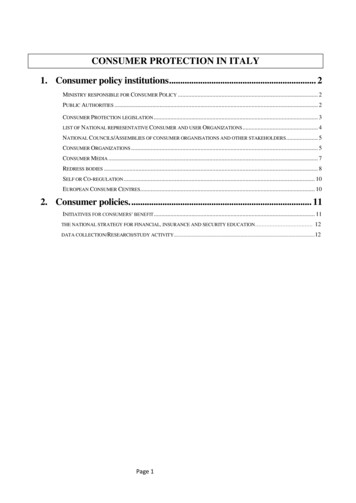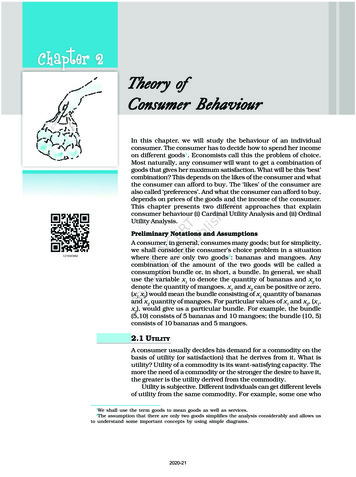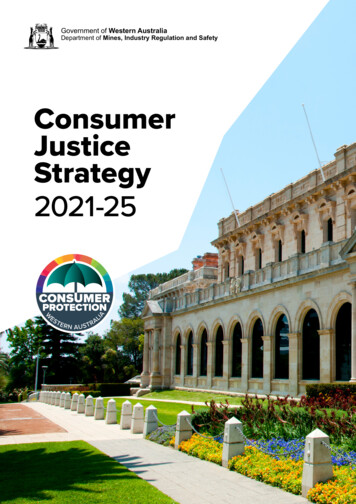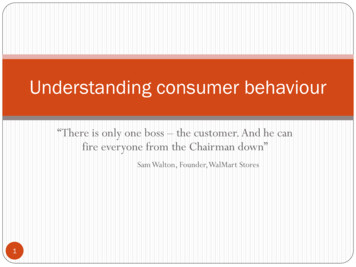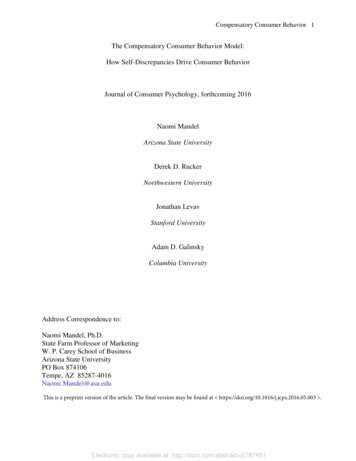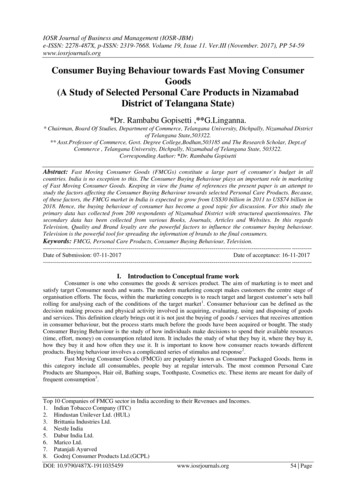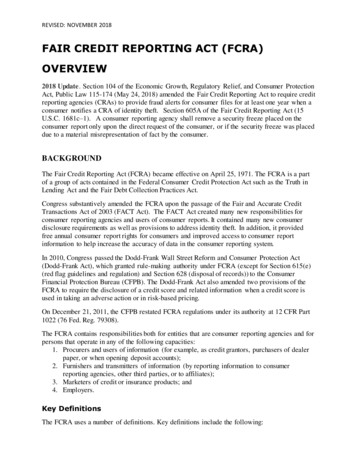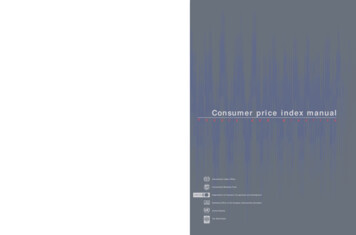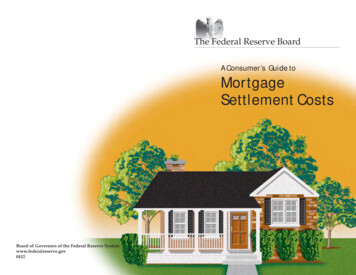
Transcription
The Federal Reserve BoardA Consumer’s Guide toMortgageSettlement CostsBoard of Governors of the Federal Reserve Systemwww.federalreserve.gov0412
The Federal Reserve Board and the Office of Thrift Supervision originally preparedthis information on mortgage settlement costs in response to a request from the HouseCommittee on Banking, Finance, and Urban Affairs. It is designed to help consumersunderstand an important aspect of home financing.This information was prepared in consultation with the following organizations:America’s Community BankersConsumer Federation of AmericaCredit Union National AssociationDepartment of Housing and Urban DevelopmentFederal Deposit Insurance CorporationFreddie MacMortgage Insurance Companies of AmericaNational Association of Federal Credit UnionsNational Association of Home BuildersNational Credit Union AdministrationOffice of the Comptroller of the CurrencyOffice of Thrift Supervision
A Consumer’s Guide to Mortgage Settlement Costs iTable of contentsSettlement costs worksheet .2Negotiate the terms of your purchase .4Understand the types of settlement costs . 5Application fee . 5Loan origination fee . 5Points . 6Appraisal fee . 6Lender-required home inspection fees . 7Prepaid interest . 7Private mortgage insurance (PMI) . 8FHA, VA, and RHS fees . 8Homeowner’s insurance . 9Flood determination fee . 9Escrow (or reserve) funds . 10Property survey costs . 10Other miscellaneous settlement costs . 11Learn about charges to establish andtransfer ownership .Title search .Title insurance .Settlement companies and other settlement agents .13131315Consider state and local government fees and taxes . 16Understand “all-in-one” pricing of settlement costs . 17Ask for estimates of settlement costs .“Good faith estimate” (GFE) .Truth in Lending information .“HUD-1/HUD-1A” statement .Fees paid outside of settlement/closing .Sample settlement costs .181818191920
ii A Consumer’s Guide to Mortgage Settlement CostsConsider these settlement cost tips . 23Where to go for help . 24More resources . 27
A Consumer’s Guide to Mortgage Settlement CostsThe mortgagesettlementprocess—sometimescalled mortgage closing—can be confusing. Asettlement may involve several interested parties and a variety of documents and fees. Thisguide helps you understand the steps involvedin the settlement process. Although the focushere is on settlements for home purchases,much of the guidance will also apply if yourefinance a mortgage.Settlement costs can be high, so it pays to shoparound for settlement services and negotiatewith the home seller, your mortgage lender,and your real estate attorney or settlementagent. The less you pay in settlement costs, themore funds you will have to get started in yournew home. 1
2 A Consumer’s Guide to Mortgage Settlement CostsSettlement Costs WorksheetAsk your lender to help fill out this checklist.Items payable inconnection with loanLoan 1Application feeLoan origination fee*PointsAppraisal feeCredit reportLender’s inspection feeLender’s attorney feesAssumption feeBroker fee (if any)Items payablein advancePrepaid interestHomeowner’s insuranceFlood determination feeFlood insurance (if needed)ReservesHomeowner’s insuranceFlood insurance (if needed)Private MI premium (generally2 months, if required)Property taxesOther assessments* See discussion within brochure for complete explanation of this item.Loan 2
A Consumer’s Guide to Mortgage Settlement CostsTitle chargesAbstract or title searchTitle insuranceTitle examinationTitle insurance binderDocument preparationNotary feesAttorney’s feesGovernment recordingand transfersRecording feesCity/County tax or stampsState tax or stampsAdditional chargesSurveyPest inspectionSettlement or closing feeOther (copying or courier fees)Total estimatedchargesLoan 1Loan 2 3
4 A Consumer’s Guide to Mortgage Settlement CostsNegotiate the terms of yourpurchaseCustoms and practices during settlement often vary regionally,with buyers and sellers free to negotiate which party pays certainfees. In slow-moving real estate markets, for example, the sellermay agree to pay certain settlement costs including points orfees usually assumed by the buyer. In fast-moving markets, thebuyer may have to agree to pay more costs to close the deal as anincentive to the seller of a property in great demand. Whateveryou negotiate should be in writing and will become the basisof the sales contract. However, be careful: if some buyer costsare shifted to the seller, the price you pay for the property mayincrease if the seller wants to recoup those costs. You can reducesome costs by shopping around for settlement services. The moreyou know about the settlement process and related costs, thebetter your chances are for saving money at settlement time.Because settlement practices vary significantly based on yourlocale, it is difficult to provide reliable estimates for costs thatfit every settlement situation you may encounter. However, onerule of thumb for buyers is to figure that settlement costs will beabout 3% of the price of your home. In some relatively high-taxareas of the country, however, 5% to 6% may be more common.Some settlement costs, such as homeowner’s insurance, privatemortgage insurance, or points, can be more expensive if yourcredit rating is low, too. Knowing your credit score, therefore, canhelp you understand how lenders will evaluate your applicationand how that score may impact the cost of your mortgage loanand help you to anticipate your settlement costs. Your lender isrequired to give you a copy of your credit score as part of thesettlement process. Make sure you get a copy of your score.
A Consumer’s Guide to Mortgage Settlement Costs 5Understand the types ofsettlement costsMost people associate settlement costs with mortgage loancharges. These fees and charges vary, so it pays to shop aroundfor the best combination of mortgage terms and settlement costs.Mortgage-related costs that may apply to your loan include thefollowing items.Application feeImposed by your lender or broker, this charge covers the initial costsof processing your loan request and checking your credit report.Estimated cost: 65 to 640, including the cost ofthe credit report for each applicantMedian cost: 365Loan origination feeThe origination fee (also called underwriting fee, administrative fee, or processing fee) is charged by the lender for evaluating and preparing your mortgage loan. This fee can cover thelender’s attorney’s fees, document preparation costs, notary fees,and similar charges.Estimated cost: 2,130 to 3,105 with a 5% downpayment; 1,984 to 2,865 with a 10% down paymentMedian cost: 2,734 with a 5% down payment; 2,537 with a 10% down payment
6 A Consumer’s Guide to Mortgage Settlement CostsPointsPoints are a one-time charge that may be negotiated with thelender, usually to reduce the interest rate you pay over the life ofyour loan. One point equals 1% of the loan amount. For example,one point on a 100,000 loan would be 1,000. In some cases—especially in refinancing—points can be financed by addingthem to the amount that you borrow. However, if you pay thepoints at settlement, they are deductible on your income taxes inthe year they are paid (different deduction rules apply when yourefinance or purchase a second home). In your purchase offer,you may want to negotiate with the seller to have the seller payall or a portion of the points.Estimated cost: 0% to 3% of the loan amountAppraisal feeLenders want to be sure that the purchased property is worthat least as much as the loan amount. An appraisal fee pays fora determination of the value of the home and lot you want topurchase or refinance. Some lenders and brokers include theappraisal fee in the application fee; you can ask the lender for acopy of the appraisal. If you are refinancing and have a recentappraisal of the property, some lenders may waive the requirement for a new appraisal.Estimated cost: 263 to 444Median cost: 292
A Consumer’s Guide to Mortgage Settlement Costs 7Lender-required home inspection feesLenders may require a termite inspection and an analysis of thestructural condition of the property by an engineer or consultant.In rural areas, lenders may require a septic system test (if applicable) and a water test to make sure the well and water systemwill maintain an adequate supply of water for the house (thisis usually a test for water quantity and not quality; your localhealth department may require a water quality test as well, butmay do so outside the settlement process and with a separatepayment). Keep in mind that such inspections are for the benefitof the lender; you may want to request your own inspection tomake sure the property is in good/acceptable condition.Estimated cost: 300 to 500Prepaid interestYour first regular mortgage payment is usually due about six toeight weeks after you settle (for example, if you settle in August,your first regular payment will be due on October 1; the Octoberpayment covers the cost of borrowing the money for the monthof September). Interest costs, however, start as soon as you settle.The lender will calculate how much interest you owe for thepart of the month in which you settle (for example, if you settleon August 16, you would owe interest for 16 days—August 16through 31).Estimated cost: Depends on the loan amount,interest rate, and number of days since settlement (forexample, a 120,000 loan at 6% for 16 days, about 220; a 142,500 loan at 6% for 16 days, about 375).
8 A Consumer’s Guide to Mortgage Settlement CostsPrivate mortgage insurance (PMI)If your down payment is less than 20% of the value of the house,the lender will usually require mortgage insurance. The insurance policy covers the lender’s losses if you do not make theloan payments. Typically, you will pay your PMI monthly alongwith each month’s mortgage payment. Your PMI can be canceledat your request, in writing, when you reach 20% equity in yourhome (based on your original purchase price) if your mortgagepayments are current and you have a good payment history. Byfederal law, your PMI payments will automatically stop whenyou acquire 22% equity in your home (based on the originalappraised value of the house) as long as your mortgage payments are current.Estimated cost: 50 to 100 per monthSome lenders will pay for LPMI—or lender’s private mortgageinsurance—and, in turn, charge a higher interest rate. Unlike thePMI that you might pay, LPMI does not automatically cancelthe insurance charge once you acquire 22% equity. To eliminateLPMI, you must refinance the loan, which means carefully considering market interest rates and settlement costs at the time todetermine whether it would be more advantageous to refinanceor to keep your current mortgage and its attendant costs.FHA, VA, and RHS feesThe Federal Housing Administration (FHA) offers insured mortgages and the Veterans Administration (VA) and the Rural Housing Service (RHS) offer mortgage guarantees. If you are gettinga mortgage insured by the FHA or guaranteed by the VA or theRHS, you will have to pay FHA mortgage insurance premiumsor VA or RHS guarantee fees. As with PMI, FHA insurance premium payments will stop when you acquire 22% equity in your
A Consumer’s Guide to Mortgage Settlement Costs 9home. FHA fees are about 1.75% of the loan amount.1 VA guarantee fees range from 1.25% to 3.3% of the loan amount, dependingon the size of your down payment (the higher your down payment, the lower the fee percentage).2 RHS fees are 2.00% of theloan amount.3Homeowner’s insuranceYour lender will require that you arrange for homeowner’sinsurance coverage (sometimes called hazard insurance) at settlement. This insurance protects against physical damage to thehouse by fire, wind, vandalism, and other causes, and ensuresthat the lender’s investment in your purchase will be securedeven if the house is destroyed. If you are buying a condominium,hazard insurance may be part of your monthly condominiumfee; you may also want to secure insurance coverage for yourhome furnishings and valuables.Estimated cost: 300 to 1,000 (Depending on thevalue of the home and the amount of coverage, youcan expect a cost of about 3.50 per 1,000 of thehome purchase price.)Median cost: 744Flood determination feeIf your home is in a special flood hazard area where flood insurance is mandated, lenders cannot offer you a mortgage loanunless you buy flood insurance. Regardless, your lender may123Fee information for loans insured by the FHA is available at http://portal.hud.gov.Information on VA guarantee fees is available at http://homeloans.va.gov/docs/funding fee tables.doc.Information on RHS fees is available at www.rurdev.usda.gov.
10 A Consumer’s Guide to Mortgage Settlement Costscharge a fee to find out whether the home is in a flood hazardarea. Flood insurance protects the lender if flooding damages ordestroys your home.Estimated cost: 10 to 16 for the search (This isnot the cost for the flood insurance; flood insurance,if required, would be in addition to your homeowner’sinsurance and may cost between 500 and 5,925depending on location and property value and loanbalance.4)Median cost: 12Escrow (or reserve) fundsSome lenders require that you set aside money in an escrow (orreserve) account to pay for property taxes, homeowner’s insurance, and flood insurance (if applicable). Lenders use escrowfunds to ensure that these items/expenses are paid on time andto protect their interest in your home. With an escrow account,money is held by the lender or its agent, which then pays thetaxes and insurance bills when they are due. At settlement, youmay need to provide funds for this account, depending on whenpayments will be due. For example, if you buy your home inAugust and property taxes are due the following January, youwill need to deposit funds into your escrow account at settlement so that you can cover tax payments when they are due inJanuary.Property survey costsLenders require a property survey to confirm the location ofbuildings and improvements on the land you are purchasing.4Flood insurance information is available at www.floodsmart.gov.
A Consumer’s Guide to Mortgage Settlement Costs 11Some lenders require a complete (and more costly) survey toensure that the house and other structures are legally where youand the seller say they are.Estimated cost: 84 to 600Median cost: 154Other miscellaneous settlement costsDepending upon the location and type of property purchased—and the extra settlement services you or your lender request—you may also have to pay some of the following fees andassessments.Assumption fee. If you are assuming (or taking over) anexisting mortgage, the lender may charge a fee.Estimated cost: Depends on the lender, but willrange from several hundred dollars to 1% of theamount of the loan you are assuming.Prorated expenses between the seller and the buyer. Inyour purchase contract, you may agree to split some costswith the seller to cover your respective periods of ownershipduring the overarching calendar year or tax period, suchas prorated property taxes. Some of these expenses mayinvolve large amounts: for example, annual condominiumfees, homeowners’ association fees, water bills, and otherlump-sum service charges.Estimated cost: Depends on the agreement betweenthe seller and the buyer.Inspection costs/fees. As a buyer, if you make your purchaseoffer contingent on the results of a home inspection—such as
12 A Consumer’s Guide to Mortgage Settlement Coststesting for structural damage, water quality, and radon gasemissions—you will have to pay for these inspections.Estimated cost: Costs vary regionally.Escrow account funds. In the purchase contract, you canrequest that the seller set up an escrow account to cover anycosts for repairs, radon mitigation, house painting, or otheritems. For example, if you do not test all the appliances (forinstance, if you buy in the summer, you may not test thefurnace), you may request an escrow account to cover repairsif they are needed in the future. The seller may agree to splitthe costs with you, in which case you would need thesefunds at settlement. Sellers sometimes offer home warrantiesin lieu of these arrangements and as an enticement to buyers.These warranties typically cover repairs or the replacementof plumbing and heating, major appliances, and other homesystems not covered by other home insurance policies.Estimated cost: Depends on the cost of repairs andthe agreement between seller and buyer.Fees paid to find a lender. As a borrower and buyer, youmay work with a mortgage broker or other third party tosecure a mortgage loan. For example, you may want towork with a broker to find a loan with nonstandard termsor conditions. Brokers arrange transactions rather than lendmoney directly; in other words, they find a lender for you.Brokers will generally contact several lenders regardingyour application, but they are not obligated to find the bestdeal for you unless they have contracted with you to act asyour agent.Estimated cost: Depends on the agreement with thebroker and often is a percentage of the loan amount.
A Consumer’s Guide to Mortgage Settlement Costs 13Learn about charges to establishand transfer ownershipTitle searchThe goal of a title search is to assure you and your lender thatthe seller is the legal owner of the property and that there areno outstanding claims or liens against the property that youare buying. The title search may be performed by a lawyer, anescrow or title company, or other specialist.Title searches can be time- and labor-intensive. Public real estaterecords can be spread among several local government offices,including surveyors, county courts, tax assessors, and recordersof deeds. Liens, records of deaths, divorces, court judgments,and contests over wills—all of which can affect ownershiprights—must also be examined.If real estate records are computerized, the title search can becompleted fairly quickly. In some cases, however, the title searchmay involve visiting courthouses and examining other publicrecords and files, which is more time-consuming.Estimated cost: Costs vary regionally.Title insuranceMost lenders require a title insurance policy to protect the lenderagainst an error in the results of the title search. If a problemarises, the insurance covers the lender’s investment in yourmortgage.
14 A Consumer’s Guide to Mortgage Settlement CostsThe cost of the policy (a one-time premium) is usually based onthe loan amount and is often paid by the buyer. However, youmay negotiate with the seller to pay all or part of the premium.The title insurance required by the lender protects only thelender. To protect yourself against title problems, you may wantto buy an “owner’s” title insurance policy. Normally the additional premium cost is based on the cost of the lender’s policy,but it can vary based on your locale.Some advice on keeping title insurance costs low: if the houseyou are buying was owned by the seller for only a few years,check with the seller’s title company. You may be able to geta “re-issue rate,” because the time between title searches wasshort. As well, if you are refinancing, you may be able to get a“re-issue rate” on your title insurance. The premium is likely tobe lower than the regular rate for a new policy. If no claims havebeen made against the title since the previous title search wasdone, the insurer may consider the property to be a lower insurance risk.Usually, you will have to buy title insurance from a companyacceptable to your lender. However, you can still shop aroundfor the best premium rates (which can vary depending on howmuch competition there is in a market area). If you decide to buyan “owner’s title policy,” look for one with as few exclusionsfrom coverage as possible. Exclusions are listed in each policy,and if a policy has many exclusions—that is, situations underwhich the insurer will not pay for your title problems—you mayend up with little/scant coverage.Estimated cost: The cost of title services and titleinsurance varies by state. For example, a lender’spolicy on a 100,000 loan can range from 175 in onestate to 900 in another. In some states, the price caneven vary by county.
A Consumer’s Guide to Mortgage Settlement Costs 15Settlement companies and othersettlement agentsSettlements are conducted by title insurance companies, realestate brokers, lending institutions, escrow companies, or attorneys. In most cases, the settlement agent provides a service to thelender, and you may be required to pay for these services. Youcan also hire your own attorney to represent you at all stages ofthe transaction, including settlement.In some regions, all parties involved in the sale—the buyer; theseller; the lender; the real estate agents; attorneys for the buyer,seller, and lender; and representatives from the title firm—maymeet to sign forms and transfer funds. In other regions, settlement is handled by a title or escrow firm, which collects all thefunding, paperwork, and signatures and makes the necessarydisbursements. This firm delivers the check to the seller and thehouse keys to you.Estimated Cost: Costs for settlement servicesvary widely, depending on the services provided.Regardless of the way settlement is handled in yourregion, shop around and ask for information on allservices provided and all fees charged.
16 A Consumer’s Guide to Mortgage Settlement CostsConsider state and localgovernment fees and taxesIn some parts of the country, transfer and recording fees are low.In other parts of the country, costs of transfer fees, recording fees,and property taxes collected by local and state governments maybe as much as 3% of the loan amount. Some of these fees, suchas the recording fee and transfer fee, are one-time fees. Althoughthere is no way to avoid paying these fees and taxes, you may beable to negotiate with the seller to assume some of these costs.But remember, you must include these terms in the purchaseoffer for the property.Funds to cover property taxes may go into an escrow account.The amount you will need depends on when property taxesare due and the timing of the settlement. The lender should beable to give you an approximation of these costs at the time youapply for the mortgage.
A Consumer’s Guide to Mortgage Settlement Costs 17Understand “all-in-one” pricingof settlement costsSome lenders have bundled most of their settlement costs into asingle price. Generally, bundled arrangements combine the following fees:application,origination,underwriting and processing,points,pest inspection,appraisal,credit reports,lender’s attorney,flood certification,title search and title insurance,recording, andfees for other tax services.This “all-in-one” price, however, does not include all of the feescharged at settlement. You will also need funds for the following:prepaid interest (based on the day of the month you settle),mortgage and transfer taxes (determined by your state orlocal taxing agency),private mortgage insurance (if needed),homeowner’s (hazard) insurance,flood insurance (if needed), andreserve (or escrow) funds for property taxes andhomeowner’s insurance.
18 A Consumer’s Guide to Mortgage Settlement CostsAsk for estimates of settlementcostsAt various points in the loan application process, you areentitled to estimates of the costs and fees associated with arranging your mortgage and completing the settlement process.“Good faith estimate” (GFE)With such a long list of potential charges at settlement, it is important to know which ones will apply to your purchase. The RealEstate Settlement Procedures Act (RESPA) requires your mortgagelender to give you a “good faith estimate” of all your expectedclosing costs within three business days of the submission of yourloan application, whether you are purchasing or refinancing thehome. Although called a good faith estimate, it is important tonote that your actual expenses at closing may be somewhat different. The standardized GFE form lists which costs will changeprior to settlement and the maximum amount by which they areallowed to change. If you are purchasing the home, a bookletprovided by your broker or mortgage lender, Buying Your Home:Settlement Costs and Helpful Information5, explains the role of thegood faith estimate in the settlement process.Truth in Lending informationFor home purchases, the lender is required under the Truthin Lending Act to provide a statement containing “good faithestimates” of the costs of the loan within three business daysafter receiving your application. This estimate will include yourtotal finance charge and the annual percentage rate (APR). TheAPR expresses the cost of your loan as an annual rate. This rate5Available at www.hud.gov/offices/hsg/ramh/res/stcosts.pdf.
A Consumer’s Guide to Mortgage Settlement Costs 19is likely to be higher than the stated contract interest rate on yourmortgage because it takes into account discount points, mortgage insurance, and certain other fees that can add to the costof your loan. When refinancing your mortgage, you will receivetruth-in-lending disclosures before you settle. Until you receivethose disclosures, the creditor and other parties cannot chargeyou fees related to your loan application, except for a fee forobtaining your credit history.“HUD-1/HUD-1A” statementWhen you purchase a home or refinance your mortgage, RESPAalso requires the lender to give you a copy of your HUD-1 orHUD-1A Settlement Statement the day before you go to settlement, if you request it. This final statement of settlement costswill show all the fees and charges you will be expected to pay atsettlement. The HUD-1 also states the initial terms of the loan,including the monthly amount due.The revised HUD-1 is designed for easy comparison with yourgood faith estimate. Most costs in the “800” to “1300” series of theHUD-1 form are labeled with the corresponding section of theGFE for reference. Included in the HUD-1 are comparison chartsfor the estimated costs provided on the GFE and actual costs paidat closing. These will be completed by the settlement agent foryou before closing with information provided by your lender.Fees paid outside of settlement/closingSome fees may be listed on the HUD-1/HUD-1A and marked asPaid Outside of Closing (POC). You will pay some of these fees,such as for credit reports and appraisals, before settlement. Otherfees, such as your direct payments to a mortgage broker, you willpay at settlement. Payments by other parties, for example, fromthe lender to the mortgage broker, also may be marked as POC.
20 A Consumer’s Guide to Mortgage Settlement CostsSample Settlement CostsBecause costs may vary from one area to another and from onelender to another, the following example is an estimate only.This example is based on a 200,000 home with a 5% or 20%down payment. Excluding reserves for property taxes and downpayment, settlement costs for the 5% down payment loan varybetween 6,235 and 19,930 (median cost 13,030); settlementcosts for the 20% down payment loan vary between 5,800 and 18,440 (median cost 11,585). Your costs may be higher or lowerthan the examples below.Settlement CostsItemTypical rangeEstimate for 200,000 house(in dollars)5% down payment20% down paymentDown payment—10,00040,000Mortgage amount—190,000160,000Items payable in connection with the loan (“800” series on HUD-1 form)Application feeLoan origination fee(may also includeunderwriting fees,administrative fees,lender’s attorney fees,notary fees, and so on)PointsAppraisal feeLender’s inspection feeAssumption fee(if applicable)Broker fee (if applicable)——0% to 3%—65 to 64065 to 640Median: 365Median: 3652,130 to 3,1051,984 to 2,865Median: 2,734Median: 2,5370 to 5,7000 to 4,800263 to 444263 to 444Median: 292Median: 292—350 to 500350 to 500 300 to 1,000——111(continued on page 21)
21A Consumer’s Guide to Mortgage Settlement CostsSettlement CostsItem(continued)Typical rangeEstimate for 200,000 house(in dol
8 A Consumer's Guide to Mortgage Settlement Costs Private mortgage insurance (PMI) If your down payment is less than 20% of the value of the house, the lender will usually require mortgage insurance. The insur-ance policy covers the lender's losses if you do not make the loan payments. Typically, you will pay your PMI monthly along
